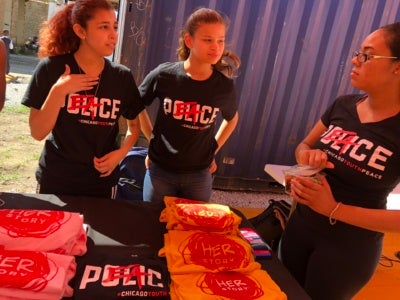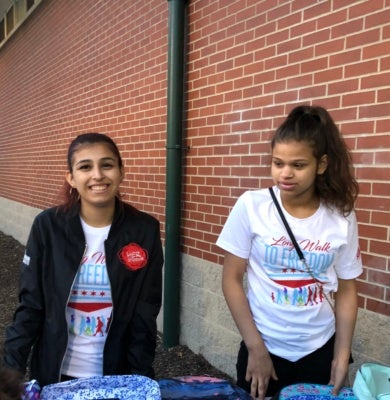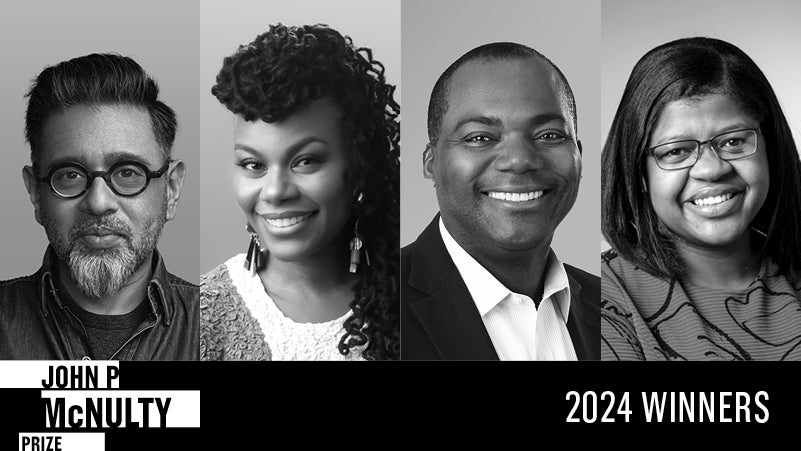![]() Chyann McQueen, age 19, is sitting at Sylvia’s Restaurant in New York City across from Jessica Disu. The air smells like soul food and McQueen is eating greens and black beans and cornbread and shrimp. She’s listening to Jessica Disu talk in that way she talks to groups, where, McQueen says, “She touches everyone—she makes everyone feel worthy and important, because she’s inclusive, because she never leaves anyone out.” Jessica Disu is talking about their mentorship group, HerStory’s, plans for the day and the businesswomen whose stories they’ll hear and in turn share their own stories with. They’ll be hearing about how these women excelled through situations similar to theirs—coming from urban neighborhoods like McQueen’s where there aren’t adequate grocery stores or safe spaces for children to play, where many adults have never been on an airplane.
Chyann McQueen, age 19, is sitting at Sylvia’s Restaurant in New York City across from Jessica Disu. The air smells like soul food and McQueen is eating greens and black beans and cornbread and shrimp. She’s listening to Jessica Disu talk in that way she talks to groups, where, McQueen says, “She touches everyone—she makes everyone feel worthy and important, because she’s inclusive, because she never leaves anyone out.” Jessica Disu is talking about their mentorship group, HerStory’s, plans for the day and the businesswomen whose stories they’ll hear and in turn share their own stories with. They’ll be hearing about how these women excelled through situations similar to theirs—coming from urban neighborhoods like McQueen’s where there aren’t adequate grocery stores or safe spaces for children to play, where many adults have never been on an airplane.
When, later that day Desiree Hines, age 24, goes and talks about her own life with the businesswomen, she’s going to draw on the skills she learned through HerStory starting when she was 16, when she says she was shy and bottled up and kept to herself. That was 2011, the year she first sat with Jessica Disu and ten other girls in a cold school room with hard walls that made their voices echo like they were on a stage and she practiced telling her story in poetry and in plain conversation. She practiced until she was on a real stage that had been set up in her school gym in front of rows of friends and family and classmates. Still shy, she took off her glasses so everyone was blurry—and it was like she was alone in the middle of the stage as she performed a poem about the fallout from the years her father was gone. And maybe it took six more years of learning with HerStory to open up further, but then she read the poem to her father, and, says Hines, “me and my father are now more genuine to each other, our relationship is closer because I was able to get that out.” So talking to the New York City businesswomen, it’ll be no problem.
And Briel Daniels, age 24, who’s known as the lion of the group will be bold and unafraid when they go speak with the businesswomen. She lost her fierceness once, back in 2014 when there were family problems, and she’d started drifting. But Daniels says Jessica Disu noticed and “she tried to spark that back into me, being that roaring lion.” Jessica Disu invited Daniels to come along with another group of hers, the Chicago International Youth Peace Movement, to their conference. Fifteen of them from all over the country went out to Chicago schools and talked on how to create peace, at night staying in a townhouse with a roof deck with views of skyscrapers and good summer breezes, but where what really mattered anyway was that there were two girls, no older than 14, and they stuck on Daniels, she says, “like puppies.” No one had ever looked up to Daniels like this before, and Jessica Disu told Daniels that her life was not just her own, it was for the two young girls too. So Daniels prayed to God she would be purposeful in everything she did, so the two young girls could see her being so, and the roar returned.
 After these three young women of HerStory return from New York to Chicago, I ask them about HerStory and Jessica. They tell me that “even when she’s relaxing, she’s working.” Daniels says growing up she’d never seen female CEOs, let alone women of color with power. McQueen says the businesswomen they’ve visited now say HerStory members can always come to them for advice. They tell me they’d never been on planes before meeting Jessica, but now she’s taken them to LA and DC and NYC, and at the museums they’ve visited they’ve learned more about African-American history than they ever learned in school. They say they’d heard Jessica rap before they joined HerStory, at a school assembly, and that everything in her songs is genuine and real.
After these three young women of HerStory return from New York to Chicago, I ask them about HerStory and Jessica. They tell me that “even when she’s relaxing, she’s working.” Daniels says growing up she’d never seen female CEOs, let alone women of color with power. McQueen says the businesswomen they’ve visited now say HerStory members can always come to them for advice. They tell me they’d never been on planes before meeting Jessica, but now she’s taken them to LA and DC and NYC, and at the museums they’ve visited they’ve learned more about African-American history than they ever learned in school. They say they’d heard Jessica rap before they joined HerStory, at a school assembly, and that everything in her songs is genuine and real.
The young women of HerStory tell me Jessica quotes Socrates and Aristotle and Plato, that she gives them books by James Baldwin, and Richard Wright, and Assata Shakur. Angel Garnica, newly 17, says, “If I don’t know who to call, I call Jessica,” and that she and her friends, “don’t see a lot people like that, that are generally honest and lovable.” Monique Manuel, 26, formerly a member and now a HerStory volunteer, tells me “there is a lot of abuse in many HerStory members’ communities, and those communities set the tone for the young women that they have to appear as strong, and strength means not being vulnerable, hurt, or affected by all that is going on.” She says Jessica creates a safe space, doesn’t judge, helps break down these barriers, lets the women know it’s not their fault. Manuel says HerStory “set the tone for the rest of my life, caused me to want to grow spiritually closer to God, want to change my behavior for the better.” She says school cliques dissolve in HerStory. That Jessica is wise beyond her years, because she’s only five years older than some of them, but it feels like ten, that she has the wisdom of an older person because of all she’s been through herself. They say they can talk to strangers now. They say that HerStory has changed their lives.
Jessica is a mentored mentor. PHENOM, an activist hip hop artist, says Jessica is “free,” like “a bird in the sky,” and that “how God made her is to be open and transparent.” He says she’s “willing to emphatically go where others won’t dare tread.” He tells me that at the inaugural hip hop concert in Millennium Park, under the otherworldly arcing metal Gehry bandshell, Jessica did her song where she drops to the floor and moves like she’s caught the holy ghost, her limbs limp but her joints popping for forty-five seconds, and then jumps right back up and continues the song. He says when an artist is that free, it gives all the other artists permission to be free too.
Jacinda Bullie, co-founder of the urban arts youth development organization, Kuumba Lynx, was Jessica Disu’s first mentor, when Disu was 14. She says Jessica is the same rooted tree she was then, only her roots have grown deeper and her branches wider. She’s watched Jessica, always grinding, battling for excellence, she watched her win Louder than a Bomb, the world’s largest youth poetry festival—twice. Bullie has watched Jessica understand “at the base of human need there’s a desire to be loved and heard, that art allows us to access each other.” She’s watched Jessica use poetry and music to break bread, be relatable, address her own healing—and to help others do the same.
When I call Jessica to interview her the first time, she’s ordering three powdered sugar plantains to go at a Nigerian restaurant with her assistant and waiting for the Laquan McDonald verdict. She immediately invites me to her birthday celebration that weekend. She never seems to be holding anything back, and whenever she excuses herself to check her phone to see if there’s news, her speech doesn’t pause, like when I ask what an average day is like for her.
The answer is that Jessica does not have an average day, in the same way that Jessica’s work doesn’t feel like work to her. But she tells me about her mornings. She says, “I wake up every day between the hours of 3am and 6am, it depends on whenever the spirit wakes me. The first thing I do is thank God that I saw another day. I lay there for a second just to reflect. I get up, I light an incense, I light a candle. I meditate. I meditate until I feel I’ve heard what God is speaking to me that day.” Next, she leaves her West Loop apartment for a thirty minute walking meditation.
Jessica tells me about HerStory and she tells me about the Youth Peace Exchange, and she tells me about her travel schedule, and that she is going to Greece tomorrow but that she is not packed yet, and how the torn meniscus in her right knee has been making travel difficult. She says to me “I wish I could send you pictures of me on my grandmother’s porch. I was always a little wiser than a typical ten-year-old, so I would mentor my younger siblings, my younger cousins, without even knowing that’s what I was doing back then. Mentoring has always been a part of my life.” She is telling me that she has five siblings, and that they were all in foster care from when she was seven to when she was twelve, but that her mom fought the system and won. She is telling me about how she mentored Chance the Rapper, and how her performance style influenced his. Thirteen minutes and fifty-four seconds into the conversation, Jessica is telling me how she was depressed from October until June last year, because she was doing all this work in her community and still seeing the same problems and was starting to think she wasn’t making an impact no matter how much people said she was doing a great job. They had to tell her that, they were her family and friends. She’d entered seminary at the Chicago Theological Seminary then, but graduate school is also depressing. But then she’d gone to the Aspen Ideas Festival and it wasn’t just her community telling her she was inspiring, it was strangers, so she believed them, and she’d also met a Kenyan woman and planned an exchange trip between the woman’s youth and hers, and Jessica was energized once more.
but that she is not packed yet, and how the torn meniscus in her right knee has been making travel difficult. She says to me “I wish I could send you pictures of me on my grandmother’s porch. I was always a little wiser than a typical ten-year-old, so I would mentor my younger siblings, my younger cousins, without even knowing that’s what I was doing back then. Mentoring has always been a part of my life.” She is telling me that she has five siblings, and that they were all in foster care from when she was seven to when she was twelve, but that her mom fought the system and won. She is telling me about how she mentored Chance the Rapper, and how her performance style influenced his. Thirteen minutes and fifty-four seconds into the conversation, Jessica is telling me how she was depressed from October until June last year, because she was doing all this work in her community and still seeing the same problems and was starting to think she wasn’t making an impact no matter how much people said she was doing a great job. They had to tell her that, they were her family and friends. She’d entered seminary at the Chicago Theological Seminary then, but graduate school is also depressing. But then she’d gone to the Aspen Ideas Festival and it wasn’t just her community telling her she was inspiring, it was strangers, so she believed them, and she’d also met a Kenyan woman and planned an exchange trip between the woman’s youth and hers, and Jessica was energized once more.
The birthday party Jessica has invited me to turns out to be not one event but two. The actual night of her birthday there are about twenty of us: her closest friends, her stepmother, her aunt, her sister, her father, a baby who is passed around constantly, and a woman she’s met the day before and had a good conversation with in her apartment hallway. We are sitting and painting and talking and eating Nigerian food. “Our mother is American,” her sister tells me, “but she loves Nigerian men,” and both women have Nigerian fathers. The canvasses we are painting will be auctioned off at Jessica’s second birthday party, the next night, which will be the first gala she’s ever thrown, a fundraiser for the Chicago International Youth Peace Exchange Movement and HerStory. Jessica is late to the painting party, we are in her apartment building long before she is, but no one seems surprised or alarmed. At the end of the night, while she’s opening her presents, tears stream down people’s cheeks as they give speeches and toast her. When she tells everyone goodnight, she announces there will be a red carpet where we can take glamor shots an hour before the gala starts the next night.
The next night, the gala, she is late again and people are much more stressed this time but are also not surprised. They’ve seen her perform at the Chicago Women’s March that morning, and marched with her, she is not unaccounted for, and they know there were gala preparations to make. There is not the promised red carpet, there is almost no one there at all, until, somehow, minutes after Jessica arrives, all the tables are filled. There is to be a performance on the roof and it’s 45 degrees Fahrenheit, and people are in cocktail attire, without jackets, but the sound system can’t be moved, at least that’s what people are saying. The performance begins, and Jessica is nowhere to be found, and The Soul Children of Chicago youth choir is singing gospel in red cardigans, their smiles sharp in the cold, and the air smells like chocolate from the nearby Blommer factory, and then finally, after two extra songs from the choir, Jessica is there and everyone’s cameras are out and people are Snapchatting her as she sings with the young people. And she and others are giving welcoming speeches, and everyone remains there, freezing on the roof in their formalwear.
And then we’re downstairs for a panel of scholars and activists discussing violence against African American women and the presentation of an $85,000 award from Google. The Google representative mentions, like I’ve heard before, that Jessica didn’t apply for the grant, they just heard about her, in fact Jessica has never applied for a grant, she’s just been given them, the philanthropists find her. And then Jessica is giving individual awards to the HerStory women, for respect, for integrity, for spirituality, and then a young man is interrupting, saying something nasty to the women, and Jessica says he has to leave, and he doesn’t, and another man grabs at him, and I can’t hear what’s going on, but suddenly he is on the floor and the two men are being restrained from each other by groups of men, and women are edging away and angling behind concrete columns because gun violence in Chicago is real, and then he’s gone and we come out from behind the columns. Jessica starts to explain, starts to talk about her transparency, but she stops. And just moves on, it’s a fundraiser for a peace movement.
During my first phone call with Jessica Disu, after she had picked up the plantains, I’d asked her what another person might do if they wanted to start mentoring like she does—not necessarily the gala part, the people standing on the candy-scented freezing roof loving her part, the international travel, the music—just the most central part. She said, “you have to know that whoever you are, you didn’t get there alone.” And then she said all you have to do is really see a person, any person, say what you see in their story and what you see it could be. And then you tell them yours.

